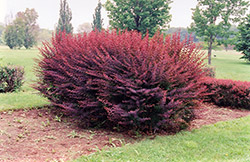It's all about ...
plants

Sheridan Red Barberry
Berberis 'Sheridan Red'
Height: 5 feet
Spread: 4 feet
Sunlight:
![]()
![]()
Hardiness Zone: 3b
Description:
A hybrid barberry with excellent rich purple foliage all season long, small but attractive flower clusters followed by showy red berries, and stunning fall colors in fiery blends; use as a color accent or for an impenetrable hedge
Ornamental Features
Sheridan Red Barberry is primarily grown for its highly ornamental fruit. The fruits are showy red drupes carried in abundance from early to late fall. It has attractive deep purple deciduous foliage. The oval leaves are highly ornamental and turn an outstanding red in the fall. It features tiny clusters of yellow flowers hanging below the branches in mid spring.
Landscape Attributes
Sheridan Red Barberry is a multi-stemmed deciduous shrub with a more or less rounded form. Its average texture blends into the landscape, but can be balanced by one or two finer or coarser trees or shrubs for an effective composition.
This is a relatively low maintenance shrub, and can be pruned at anytime. Deer don't particularly care for this plant and will usually leave it alone in favor of tastier treats. Gardeners should be aware of the following characteristic(s) that may warrant special consideration;
- Spiny
Sheridan Red Barberry is recommended for the following landscape applications;
- Mass Planting
- Hedges/Screening
- General Garden Use
Planting & Growing
Sheridan Red Barberry will grow to be about 5 feet tall at maturity, with a spread of 4 feet. It tends to be a little leggy, with a typical clearance of 1 foot from the ground, and is suitable for planting under power lines. It grows at a medium rate, and under ideal conditions can be expected to live for approximately 25 years.
This shrub does best in full sun to partial shade. It is very adaptable to both dry and moist locations, and should do just fine under average home landscape conditions. It is considered to be drought-tolerant, and thus makes an ideal choice for xeriscaping or the moisture-conserving landscape. It is not particular as to soil type or pH, and is able to handle environmental salt. It is highly tolerant of urban pollution and will even thrive in inner city environments. This particular variety is an interspecific hybrid.
This plant is not reliably hardy in our region, and certain restrictions may apply; contact the store for more information.
